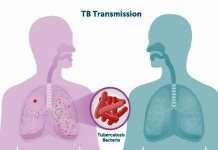 Hiccups, which occur when the diaphragm and respiratory organs encounter an abrupt, involuntary spasm, happen to everyone on occasion. ‘Anything that causes your stomach to become distended can cause hiccups,’ says Timothy Pfanner, MD, assistant professor of medicine at the Texas A&M Health Science Center College of Medicine. Usually, a bout of hiccups lasts for a brief period and then goes away on its own. However, Dr. Pfanner warns that when hiccups are longer lasting or out of the ordinary from what you typically experience, more serious health issues might be at hand.
Hiccups, which occur when the diaphragm and respiratory organs encounter an abrupt, involuntary spasm, happen to everyone on occasion. ‘Anything that causes your stomach to become distended can cause hiccups,’ says Timothy Pfanner, MD, assistant professor of medicine at the Texas A&M Health Science Center College of Medicine. Usually, a bout of hiccups lasts for a brief period and then goes away on its own. However, Dr. Pfanner warns that when hiccups are longer lasting or out of the ordinary from what you typically experience, more serious health issues might be at hand.
Here are the things:
You have acid reflux disease
Telltale signs of acid reflux disease include heartburn, the regurgitation of a bitter-tasting acid, and nausea. Interestingly, hiccups that don’t let up are also a symptom of GERD. If they persist, check with your doctor to see if you have acid reflux disease, which can be disruptive to your lifestyle and of course, your stomach and esophageal health.
You’re really stressed out
Hiccups may be warning you that you need to take some time out for yourself. The Mayo Clinic lists emotional stress as one of the many causes of hiccups, so if you’ve been noticing hiccups accompanying your elevated stress levels, consider taking steps to restore your inner peace such as meditation, exercise, or finally taking your company up on that well-deserved vacation time. These are other signs you’re more stressed out than you think.
Hiccups could be a sign of cancer
Hiccups could indicate the presence of some types of cancers, including those in the brain, stomach, or lymph nodes. Compared to persistent hiccups, which last anywhere from 48 hours to less than 30 days, Pfanner notes that intractable hiccups—hiccups lasting more than 30 days—have been associated with the aforementioned cancers in some patients. Hiccups lasting this long usually indicate that something more serious is occurring internally. But breathe a sigh of relief: experts note that it’s extremely rare for hiccups to be a sign of cancer.
Hiccups could be a pneumonia clue
Long-lasting hiccups could be an indication of pneumonia. While you’ll likely experience other pneumonia symptoms such as chest pain, chills, fever, and perhaps shortness of breath, hiccups too, have been documented as a possible sign of this lung infection.
Hiccups could indicate you have an inflammatory disease of the central nervous system
One of the symptoms of neuromyelitis optica spectrum disorder (NMOSD)—sometimes mistaken for multiple sclerosis—are persistent hiccups. Episodes of vomiting, visual loss, and nausea are also symptoms of this inflammatory disease of the central nervous system which affects the brain, brain stem, optic nerves, and spinal cord.
Hiccups could be part of early stroke symptoms
A national survey released by the Ohio State University Wexner Medical Center determined that most women did not know that hiccups could be an indication of a stroke. Of the 1,000 women questioned, only a mere 10 percent were aware that in addition to typical stroke symptoms, hiccups coupled with atypical chest pain are an early warning sign of a stroke in women.
Hiccups could mean you’re having a heart attack
If you’ve had hiccups that haven’t gone away for a few days, you could be having a heart attack.
Hiccups could mean that your kidney function is worsening
If you have chronic kidney disease and start having frequent hiccups, that could be an indication that your kidney is deteriorating even further. Hiccups, along with symptoms like bone pain, abnormal breath odor, and muscle twitching are a few signs of such worsening—transcending earlier symptoms of chronic kidney disease such as headaches, fatigue, and appetite loss. Since the kidneys are responsible for the removal of waste and excess water in the body, its ability to work effectively is essential. Hiccups in conjunction with these other symptoms could indicate that your kidney is in serious trouble; options such as dialysis may be necessary.











Very educative article